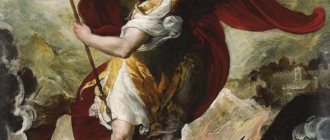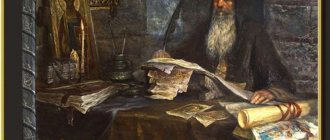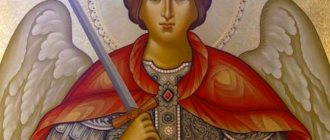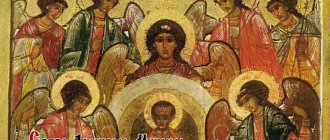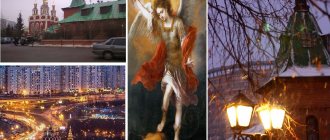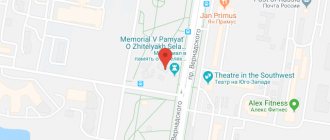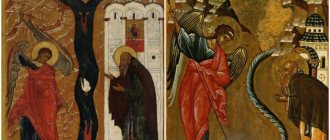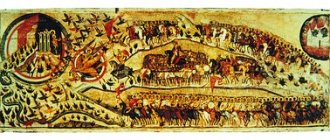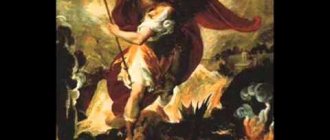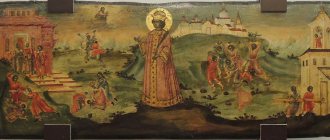Painting “Prince Mikhail Vsevolodovich in front of Batu’s headquarters”, artist Vasily Smirnov (1858–1890)
Prince Mikhail of Chernigov was killed in the Horde by one of the first in a long list of Russian rulers. But not all the Mongol victims were canonized as holy martyrs by the Orthodox Church of Christ...
He lived the ordinary life of an appanage prince, deftly balancing among strife and civil strife; there were ups and humiliating downs in his fate. Historical documents say that the prince was not famous for his special piety... But everything changed in the last hour of his life, an hour of feat that made him one of the most revered saints of Ancient Rus'.
Day of Remembrance
“And so, without mercy from the unclean, he was killed quickly, and the end of his life was accepted in the month of September on the 20th day (1246) in memory of the holy martyr Eustathius,” the chronicler testified to the martyrdom of the commander of Chernigov-grad for refusing to bow to the image of a dead person, since “for Christians this it’s not appropriate to create,” after these words, “Batu became furious.”
On this day, the Holy Church honors his memory - October 3 (new style). Another date - February 27 - refers to the day of transfer of the honorable remains.
Another annual point of remembrance is October 5 according to the Gregory calendar as part of the Council of Tula Saints.
Saint Michael of Chernigov - martyr for the faith
Estimated reading time: 5 min.
In the center of Moscow there is Chernigovsky Lane, named after the elegant stone church of the 17th century - the temple of the Chernigov miracle workers Prince Michael and Boyar Theodore. Nowadays the name of the Chernigov prince is somewhat forgotten, but he was one of the most revered saints of Ancient Rus'.
This ruler has a strange fate. His whole life does not stand out in any way from the history of inter-princely feuds, campaigns, agreements concluded and agreements broken, feasts and other affairs of government that filled the life of the ruling class in Rus'. And only a few hours before the deadline, the prince’s biography miraculously turns over, like an hourglass that finds itself in someone’s high hand.
Mikhail Vsevolodovich was the son of Prince Vsevolod Svyatoslavich Chermny and Maria, the daughter of the most powerful of the Polish princes Casimir II. Knyazhich was born in 1179. For a long time he did not rule anything, in any case, there is no news about this in the chronicles. The first princely “table” was obtained for him by his father in a grave dispute. Having settled in the Grand Duchy of Kiev, Vsevolod Chermny expelled Prince Yaroslav Vsevolodovich (father of Alexander Nevsky) from neighboring Pereyaslavl South and sent his son Mikhail there. A few years later, the great bloodshed in the south of Rus' subsided. The “party” to which the young Prince Mikhail belonged secured Kyiv. Soon Vsevolod Chermny passed away. Since then, and for many years, Mikhail Vsevolodovich led a modest, politically inconspicuous life.
It changed dramatically in 1223. A large coalition of Russian princes in alliance with the Polovtsy took the first blow of the Mongol-Tatar army on Kalka. The Chernigov princes brought their regiments and, together with everyone else, were defeated. Among other rulers of the Russian land, Prince Mikhail’s uncle, Mstislav, Prince of Chernigov, also lay down in the ground. In hard times, his nephew took his place on the Chernigov “table”: all of Rus' grieved for those killed on Kalka...
The Chernigov principality was then almost the most extensive and one of the richest in Rus'. In addition, it is located in the very center of Russian lands. Thus, Mikhail Vsevolodovich got, firstly, an enviable reign and, secondly, by virtue of the place he occupied alone, he found himself among the leading politicians of the country. Such a significant status also meant a very hectic life. The Prince of Chernigov participates in several major inter-princely feuds, leads armies against neighbors, and repels their attacks on the Chernigov region. However, this is still not a big war.
The storm broke out when Mikhail Vsevolodovich was entering, according to the concepts of that time, old age. Year after year, a daring, quick-witted politician grew stronger - Prince Daniil Romanovich, ruler of Galich and Volyn, neighbor of the Chernigov region... The year 1234 was the beginning of a great storm, which for several years cruelly tormented all of Southern Rus'. The conflict, which flared up and then died out on the lands of the small Principality of Galicia, ignited a great armed confrontation that broke out far beyond its borders.
Four years of bloody battles and great devastation - and then the time of political triumph for Mikhail Vsevolodovich came: he occupied Kyiv and became, albeit briefly, the Grand Duke; Then he manages to recapture Przemysl from Daniil Galitsky. Mikhail Vsevolodovich will never achieve such significant success again.
While merciless strife was burning in the south of Rus', the north was attacked by the Mongol-Tatars. Chernigov, mired in its own problems, exhausted, ruined, but still not stopping hostilities, did nothing to help its northern neighbors. And in 1238 or the very beginning of 1239, the Mongol-Tatar hammer fell on Mikhail Vsevolodovich himself. As the chronicle reports, “...the Tatars took Chernigov, their princes went to the Ugra (Hungary), and burned the city and killed the people and plundered the monasteries.”
Mikhail Vsevolodovich wandered around a foreign land for a long time, trying to enlist the support of either the Poles or the Hungarians. Unable to find help against the Tatars, the prince made peace with his longtime enemy Daniil Galitsky, received little Lutsk from him “to feed”, and after the Mongol-Tatars ravaged Kiev, he returned there and sat on a ghostly throne, surrounded by ruins drenched in blood . In 1242–1243 he tries to stay in Kyiv, then leaves there and returns to the half-dead Chernigov.
A few years later, it was his turn to go to the Horde, to bow to Batu. All the Russian princes of that time of any significance had to visit the Khan's headquarters... There the prince accepted death for the faith that glorified him in the memory of his descendants. Perhaps the years of shame, wanderings, and hardships helped Mikhail Vsevolodivch understand how frail earthly glory is, how quickly a noble man can fall from the height of his position. His spirit was thus filled with humility and prepared for asceticism.
Here is a laconic account of the chronicle about the death of Mikhail Chernigovsky in the Horde. “That same summer, Mikhailo, Prince of Chernigov, went with his grandson Boris to the Tatars, and when he was in their camp, he sent Batu to Prince Mikhail, ordering him to bow down to the fire and kill them. Mikhailo, the prince, does not obey the command... but reproach him and his deaf idols. And so, without mercy from the unclean, he was killed, and the end of his life was accepted in the month of September on the 20th day [1246] in memory of the holy martyr Eustathius.”
In other words, the prince was required to bow to pagan idols and walk between two lit bonfires - to do as most Russian princes who appeared in the Horde did. He considered such worship incompatible with the Christian faith, and declared the “idols” to be “deaf,” i.e. a simple tree that does not contain anything divine. The prince paid with his life for his loyalty to Christ. Together with Mikhail Vsevolodovich, his boyar Fedor, who also accepted the death of a martyr, refused to worship pagan idols.
A politician to the core, a poor prince of a poor principality gives up his life, keeping the spark of faith in his soul from desecration... Who could have expected such an act from him?!
The story of the confessional death of Prince Mikhail in the Horde spread throughout Rus'. He became not only a saint, but also a folk hero. In the middle of the 16th century, Mikhail Chernigovsky received all-Russian veneration. His relics were transported from Chernigov to Moscow. Now they are in the Archangel Cathedral of the Moscow Kremlin.
The fate of this man is similar to the story of the pious thief who believed on the cross, seeing the Son of Man next to him. Sometimes, over the course of many years, a person sins, whether more or less than other people, but, in any case, no signs of righteousness are visible in him. And on the last day, hour, or even at the last minute, he can behave in such a way that all his sins will be forgiven and he will be rewarded with the Kingdom of Heaven.
Mikhail of Chernigov whiled away his time, waging wars and seeking honor, glory, and wealth for his family. A major politician, but, in general, a commoner - successes in his life alternated with failures, but his last years were spent in humiliation. But God gave him a chance to go beyond the usual circle of princely concerns, and he shone, and his whole life turned upside down, filled with new meaning.
The source of the illustration is the website of the Kemerovo and Novokuznetsk diocese.
The fate of Mikhail of Chernigov and his boyar Theodore
Chernigov prince Mikhail and boyar Theodore in 1246 arrived in the capital of the Golden Horde (Ulus Juchi) - the city of Sarai. The ruler was called by the khan, who bore the name Batu, to confirm Mikhail’s rights to reign and to issue him on this occasion a visible sign of Mongol-Tatar recognition of his power - a label.
Before setting off on their journey, Mikhail and Theodore received from the ruler’s confessor, a bishop named John, a blessing for the feat of martyrdom for the sake of Jesus Christ. Upon the arrival of the ruler and the Bolyarin in the Golden Horde, they began to be forced to go through ritual fires and worship idols. According to some sources, the idols were the sun and fire, according to others, a bush (this is reflected in the troparion), according to others, the idol was a statue of Genghis Khan. The prince and boyar refused to do what was required, and this was reported to Batu Khan.
The Khan sent his servant named Eldega to inform Michael and Theodore that if the demands were not met, they would suffer a painful death. To this, the prince offered a compromise, expressing his readiness to bow only to the khan himself, since he was allowed by God to have power. The future martyrs prepared for the feat by accepting Holy Communion, which they received from Michael’s confessor, Bishop John, and had not received until that moment.
According to some reports, Michael’s grandson, Prince Boris, and the boyars of Rostov persuaded the future martyr to sin with the intention of subsequent repentance, but he showed perseverance. So in the life, compiled by Saint Demetrius of Rostov, that the princes offered to take the blame for sin upon themselves before their confessor. It turned out that what the prince and the boyar were preparing for was beginning to come true, since the answer did not satisfy Batu.
Michael was beaten for a long time and cruelly until the ground was stained with blood, after which an apostate named Daman cut off his head. Boyar Theodore was offered to fulfill what was commanded and they promised to elevate him to rulers instead of the severely executed Mikhail. Theodore refused, and he was similarly tortured, beaten until the ground beneath him was bleeding, and his head was beheaded.
Batu Khan on the throne of the Golden Horde
There is also an opinion that the ruler was forced to drink kumis, which he also refused for religious reasons, following the logic that since this drink is sacred to the pagan Mongols, then drinking it by an Orthodox person would be a sinful act - renunciation or eating something sacrificed to idols.
The tormentors threw the tormented bodies of the holy martyrs of Christ to be torn to pieces by dogs, but by God’s action they remained intact. A few days later, Christians secretly buried them with honors. Then the relics were moved to Chernigov. There is an opinion that until the moment Orthodox Christians acquired bodies before their funeral, Divine action in relation to bodies was expressed visibly in the form of pillars of fire.
Mikhail Vsevolodovich Chernigovsky
Childhood
Mikhail Vsevolodovich Chernigovsky was born in 1179. His father - Vsevolod Svyatoslavovich, nicknamed Red or Cheremnoy - was an active participant in princely strife and at different times occupied the Starodub, Chernigov and Kiev thrones. In 1178 he married the daughter of the Polish king Casimir II the Just, Maria. A year after the wedding, their first son, Mikhail, was born.
Little information has been preserved about the prince’s childhood. The next mention of the young prince in the sources, after his date of birth, dates back to 1186. At the age of 7, Mikhail became seriously ill, but was healed by the Pereyaslav stylite Nikita, and on May 16 of the same year a stone cross was erected at the place of healing.
In princely strife
The next time we meet Mikhail he is already an adult, a 27-year-old man, actively participating in the internecine struggle, and then his biography is a series of temporary political alliances, concluded and broken treaties, wars and campaigns. It is not much different from the biographies of other representatives of the Rurik family of that turbulent time of feudal fragmentation and permanent external danger.
Having reached a respectable age according to medieval standards, Mikhail was not yet the ruler of any principality and played an inconspicuous role in complex princely relations. Mikhail’s first “fatherland” was provided by his father Vsevolod Cheremnoy. In August-September 1206, he expelled the Southern Prince Yaroslav Vsevolodovich from Pereslavl and planted his son there. True, Mikhail did not remain the sovereign prince for long and after a few months he was forced to leave Pereslavl.
In 1211, quite late by medieval standards, Mikhail married Elena, the daughter of the influential Galician prince Roman Mstislavovich. In this marriage three children were born: two daughters Maria and Theodulia (the future Saint Euphrosyne of Suzdal) and a son Rostislav.
The year 1223 has special significance in Russian history. By this time, one of the most serious opponents of Ancient Rus' had already appeared on the horizon - the Mongol-Tatars led by Genghis Khan. They conquered Central Asia, Transcaucasia and reached the Black Sea and Don steppes, inhabited by the Polovtsians and bordering the Russian principalities. Relations between Russians and Polovtsians are a story of not only rivalry and enmity, but also alliance. Russian princes, including Mikhail's father Vsevolod Cheremnoy, often used Polovtsian military force in their struggle with other Rurikovichs. Now, when the time of general danger came, the Polovtsians turned to the Russian princes for help. In 1223, Mikhail, as a junior prince, sat at the princely congress convened on this occasion, and on May 31, as part of a united Russian-Polovtsian army, he participated in the battle on the Kalka River. He was lucky, he survived and in the same year received the Chernigov table, since his uncle, the Chernigov prince, died in the battle. Ownership of the rich, vast Chernigov principality, located in the center of Russian lands, instantly put Mikhail Vsevolodovich in the first rank of politicians of his time.
In 1224, Mikhail, together with the Great Prince of Vladimir Yuri Vsevolodovich, went on a campaign against Novgorod and received reign there for a short time. In 1225, he voluntarily left Kyiv for his homeland - Chernigov. The reason for this act of the prince remained unknown. In 1226, Chernigov was occupied by Oleg Kursky and Mikhail was faced with the task of regaining his family principality. He succeeded in this with the help of influential forces: the squads of the two Grand Dukes Yuri Vsevolodovich of Vladimir and Vladimir Rurikovich of Kyiv, as well as the support of Metropolitan Kirill. In 1228, in alliance with Vladimir of Kyiv, Mikhail launched a campaign against his closest relative, the Galician-Volyn prince Daniil Romanovich. The campaign was successful and led to the release of the Czartory princes Vladimir and Michael. In 1229, Mikhail received an offer from the Novgorodians to again occupy the princely throne. Most likely, this was facilitated by Prince Yuri Vsevolodovich, who competed with his younger brother Yaroslav, who had already twice occupied the reign of Novgorod and continued to lay claim to it. Having become the Prince of Novgorod, Mikhail chose to return to Chernigov, leaving in Novgorod under the supervision of Bishop Spiridon his son Rostislav, who by that time was 3 or 4 years old (the exact date of his birth has not been established). This practice of “nurturing” young princes was widely used by the Novgorodians. However, Rostislav did not manage to stay in Novgorod, the mood of the local residents changed and for the third time they invited Yaroslav Vsevolodovich Pereyaslavsky to reign, who brought and left here his sons Fyodor and Alexander, the future Nevsky.
In 1231, Mikhail Chernigovsky, for an unknown reason, broke relations with his former allies - princes Yuri Vsevolodovich and Vladimir Rurikovich, thus multiplying the number of his enemies, which already included Daniil Romanovich Galitsky and Yaroslav Vsevolodovich Pereyaslavsky.
Beginning in 1234, Mikhail of Chernigov fought with his southwestern neighbor Daniil of Galicia. In 1238, Mikhail briefly achieved important success - he took the grand-ducal throne in Kyiv. However, this success was short-lived, since the country was already in full control of the Mongol-Tatars, who had ravaged the North-East. Now their path lay to the west, to Europe, and therefore through the lands of Kyiv, Chernigov and Galich.
During the invasion
During the Mongol invasion, Mikhail of Chernigov did not support those princes who came out to defend their country with arms in hand. In 1238, Tatar ambassadors arrived to Michael for negotiations, possibly offering to enter into an agreement with the Horde. As A.N. Nasonov writes, Mikhail “did not listen to them,” but was afraid to enter into an open military confrontation. Chernigov fell under the Mongol-Tatar military onslaught. But the prince was already far away at that time. In 1239 he fled to Hungary and from there to Poland. Kyiv was occupied first by Rostislav Mstislavovich Smolensky, and then by Daniil Galitsky. The latter’s protege, Dmitry, met the Mongols under the walls of the “mother of Russian cities.”
Mikhail, who had lost Kyiv and Chernigov, went from Poland to his longtime enemy Daniil Galitsky. Circumstances forced these rivals to make peace and Daniel even promised Mikhail to return Kyiv, but he, fearing the Tatars, remained near Galitsky, where he was assigned “feeding” - the small town of Lutsk. Only after the invaders “descended from the Russian lands” did he return to the destroyed and plundered Kyiv and settled near the city “on the island.” When the Mongol army was returning from its western campaign in 1242–1243, Mikhail again left first for Chernigov, and from there to Hungary.
However, despite the very difficult internal political situation in the country, the princely feuds did not stop. By this time, in Rus', three prince-leaders stood out from the general mass of Rurikovichs: Yaroslav Vladimirsky, Daniil Galitsky and Mikhail Chernigovsky. Each of them was full of ambition and hardly regarded their position as worthy. Yaroslav and Daniil were in difficult relations with the boyar aristocracy of their principalities and experienced serious pressure from external competitors; Mikhail, having lost Kyiv and Novgorod, actually turned into a weak competitor for his more successful relatives. Therefore, they may have regarded receiving a label in the Horde, even taking into account the inevitable loss of sovereignty, as a chance to take a leading position among the Russian princes.
Now much depended on the mercy of the ruler of the Golden Horde. Batu's position towards the new vassals was ambiguous. On the one hand, the Horde sought to make them as humble as possible and brutally suppressed the slightest signs of disobedience. Disobedience was instantly punishable by death. According to the testimony of the monk Julian, who visited the lands conquered by the Tatars in 1237–1238, “in all the conquered kingdoms they immediately kill princes and nobles who inspire fear that they might someday offer any resistance.”
. Therefore, in the first 100 years after the invasion, more than 10 Russian princes were killed in the Horde.
On the other hand, the Horde, to a certain extent, was ready to integrate Russian princes into its elite, realizing that the carrot must always be complemented by the stick. Of course, the Russians could not count on an equal position with the Tatars, and this is evidenced by the Italian traveler Plano Carpini. “It was we who saw at the court of the emperor how the noble husband Yaroslav, the Grand Duke of Russia, as well as the son of the Tsar and Queen of Georgia... did not receive any due honor among them, but the Tatars assigned to them, no matter how low their rank, walked ahead of them and always occupied the first and most important place"
.
Three princes were summoned to the Horde, but their trips ended with fundamentally different outcomes.
In 1245, Batu apparently decided to extend the tribute to the Galich land and sent his ambassador to Daniil. At the same time, military pressure was increased on him. Daniel was actually forced to go to Batu: “and after thinking with my brother, and going to Batu, the river: “I will not give my half-homeland, but I will go to Batu myself.”
. Daniel managed to avoid the pagan ritual of worshiping the idol of Genghis Khan, received a label and thereby became the “servant” of the khan, while simultaneously intending to continue his own political line, not controlled by the Horde, aimed at regaining the former state sovereignty. Returning from Batu, Daniil Galitsky entered into negotiations with Pope Innocent IV, intending to receive military assistance from him.
A different position was taken by the Vladimir-Suzdal prince Yaroslav, who in 1243, i.e. immediately after the return of the Tatar army from the campaign to the west, he went to him with an expression of humility and desire to serve. Batu placed Yaroslav Vsevolodovich in the position of the oldest “prince of all in the Russian language”
and handed over Kyiv to him. Yaroslav, thus, showed maximum humility and even, perhaps, fit into the ranks of the Horde nobility, but was sent by Batu to Karokorum and this trip became fatal for him.
Death and canonization
Mikhail Chernigovsky went to Batu “asking for his volost from him”
only in 1246 and became his first victim.
A description of the circumstances of the death is contained in the work of Carpini and in “The Tale of the Murder in the Horde of Prince Mikhail of Chernigov and his boyar Fyodor
.
Sources say that when Mikhail arrived in the Horde, Batu sent his magicians to him, who turned to the prince: “Batu call you
.
They were given an order: “If you eat according to your custom, do it for Prince Michael, then bring him before me
.
The custom prescribed to walk between the fires, bow to the sun and the idol of Genghis Khan. However, Mikhail and his boyar Fyodor refused to perform this ritual, rightly considering it pagan and “vocalist to them: “It is not worthy for Christians to walk through fire, nor to bow down to whom these people bow.
This is the Christian faith: do not worship the creature, but worship the Father and the Son and the Holy Spirit .
The disobedience was immediately reported to Batu. He fell into anger and presented Michael with a choice: “from now on, choose one from the two: either bow to my god and live and accept the reign, or if you don’t bow to god, you will die an evil death
.
Mikhail tried to soften the situation and find a compromise: “I bow to you, king, because God entrusted you with reigning in this world. But what you order me to bow to, I will not bow to.” However, this did not help and Batu did not soften his decision. Despite the persuasion of his grandson, Prince Boris of Rostov, and the boyars, Mikhail did not change. “Then the murderers arrived, jumped off their horses and grabbed Mikhail, stretching out his arms, and began to hit his heart with their hands.
Seven at a time, they threw him prone on the ground, kicking and kicking. This is why the former needs it. Someone who was formerly a Christian and later rejected the faith of Christianity and became a desecrated lawbreaker named Doman, this one, cut off the head of the holy martyr Michael and rejected the rest. Then Feodorov said: “You bow to our gods and accept all the reign of your prince .
And Theodore said to them: “I don’t want a reign, and I don’t bow to your gods, but I want to suffer for Christ, just like my prince!”
.
Carpini, similarly describing the circumstances of the prince’s death, makes a very important remark for understanding the essence of what happened: “for some, they also find an opportunity to kill them, as was done with Mikhail and others.”
. Therefore, it can be logically assumed that the refusal to go through the fire was only a pretext for execution, and its true reasons lay in the political sphere. A. N. Nasonov writes that, firstly, there is specific data indicating the participation of the Vladimir-Suzdal prince Yaroslav Vsevolodovich in this bloody drama. It was he who received the greatest benefit from the elimination of his main rival and the political weakening of the Chernigov principality. Secondly, Batu could have experienced acute distrust of the Chernigov princes because of their Western orientation and contacts between Mikhail Chernigovsky and Daniil Galitsky.
The death of Mikhail Chernigovsky in the Horde, his steadfastness in faith, made a hero out of this prince. So the prince, who could have remained unnoticed among similar, unremarkable ordinary historical characters, suddenly at the end of his life turned not just into a hero, but into a symbol of resistance, human dignity and unwavering faith. The spiritual authority of Mikhail Chernigovsky in that situation of humiliation, yoke, and lack of rights gave ground under the feet of those who had not lost faith in the future of their country. Therefore, by order of his daughter Princess Marya, a church was erected in Rostov, which marked the beginning of the church veneration of Mikhail and Fyodor. After her death in 1271, the first tale of their Christian deed was compiled. On its basis, at the end of the 13th century, Father Andrei wrote “The Word of the New Holy Martyr, Michael, the Russian Prince and Theodore, the first governor in his reign.”
, and at a church council in 1572, Mikhail Chernigovsky was canonized. Subsequently, his remains were buried in the ancestral tomb of the Rurikovichs - the Archangel Cathedral of the Moscow Kremlin.
M. P. Dudkina, Ph.D. ist. sciences
especially for the portal BankGorodov.RU
Literature:
- The tale of the murder of Prince Mikhail of Chernigov and his boyar Fyodor in the Horde. // Library of literature of Ancient Rus'. T. 5. – St. Petersburg, 1997.
- Gorsky A. A. The death of Mikhail of Chernigov in the context of the first contacts of the Russian princes with the Horde. // Medieval Rus'. Vol. 6. – M., 2006.
- Nasonov A. N. Mongols and Rus' (History of Tatar politics in Rus'). – M., 1940.
- Seleznev Yu. V. Russian princes in the political system of the Dzhuchiev ulus (Horde) // Dissertation for the degree of Doctor of Historical Sciences. – Voronezh, 2014.
- Poluboyarinova M.D. Russian people in the Golden Horde. – M., 1978.
Biography of Prince Mikhail Vsevolodovich
Mikhail Vsevolodovich lived from 1179 to 1246.
In historical science, the prevailing opinion is that Mikhail is the son of Vsevolod, who was the prince of Chernigov and Kyiv, but there are historical documents that say that Mikhail is not his son.
Michael was in poor health and for the sake of the prayers of the holy Venerable Nikita, famous for his feat of stylites and having such a nickname, he was healed. The ascetic gave him a staff made of wood.
He would be the ruler:
- Pereyaslavl (possibly) - in 1206;
- Chernigov (from 1223/1226 to 1246);
- Novgorod (from 1225 to 1226 and from 1229 to 1231);
- Galich (from 1225 to 1238);
- Kyiv (supreme command) - from 1238 to 1239 and from 1241 to 1243.
There is no information regarding which territories the power of Chief Mikhail extended, but he was in a high place in the ladder of chiefs. L.V. Voitovich believes that Mikhail Vsevolodovich ruled a principality close to Chernigov, and that he was not Snovskoye, Vshchizhskoye, or Starodubskoye.
Front chronicle (volume 5, p. 417): “And according to Yaroslav, Prince Mikhail of Chernigov, son of Vsevolod Cheremna, sat down in Kyiv for the great reign”
The Holy Martyr of Christ Michael of Chernigov took part in a clash on the river called Kalka, which took place in 1223. After the death of the ruler Mstislav as a result, Mikhail accepted the table of Chernigov.
He acquired Novgorod as a ruler after a conflict between the Vladimir chief Gyurgiy, the husband of his sister, and the bolyars of Novgorod, exchanging prisoners.
- In 1226, with the support of Yuri Vsevolodovich, the holy martyr Michael fought against Olga of Kursk. It is unknown why this campaign was undertaken.
- In 1228, he took part in the siege of Kamenets, which ended in failure. Rostislav Pinsky and Volodimir, a descendant of Rurik, helped Mikhail to besiege this city.
- In 1229 , due to famine, he abolished for a period of five years the tribute (tribute) for smerds (initially free, but then still forced into serfdom, peasants).
- I decided not to fight for Novgorod when the Volodymyr-Suzdal rulers made a military expedition to Chernigov in 1231.
- In 1234 he fought for Kiev, being in allied relations with Izyaslav.
- In 1235, as part of military counter-actions, the commander Mikhail took Galich.
- In 1237, the leaders of Ryazan-grad turned to Mikhail with the hope of receiving assistance in the battle with the Tatar-Mongols, but he refused them due to the fact that they did not help him in the battle on the Kalka River.
Interesting fact
The ambassador from those in charge in Ryazan-grad was Evpatiy Kolovrat.
- In 1238-1239, Michael carried out military measures against Lithuania.
- In 1239, Ruler Mikhail gave the order to allow Horde ambassadors to leave their bodies.
From the Tatar-Mongol attack on the Chernigov-Suzdal territory, Mikhail fled to Hungary and persuaded the Hungarian, Polish and German rulers to carry out a crusade against the Mongol-Tatars, but was refused.
In 1243, Mikhail left for the marriage of his son in Hungary, and Kiev was transferred by the khan to another prince - Yaroslav, the son of Vsevolod, Volodymyr.
Before leaving to shed his blood, the holy elder Michael was the prince of Chernigov-grad.
Mongol invasion
From this moment on, facts appear in the biography of the future saint that do not fit very well with the cult that was subsequently constructed by Russian spiritual leaders. In 1237, ambassadors from Ryazan arrived at the court of the Chernigov prince with a request for assistance in the fight against foreign invaders. The delegation was headed by the well-known Evpatiy Kolovrat, who later wrote his name in golden letters on the page of the military exploits of Rus'.
P. Litvinsky “Evpatiy Kolovrat”. (rounb.ru)
However, Mikhail reminded the envoys that in 1223, during the first head-to-head confrontation between the Mongols and Russian principalities, the Ryazan regiments did not appear on the battlefield, after which he refused the guests’ request. It’s hard to say how history would have turned out had Mikhail sent his regiments to help the Ryazan people. In any case, by leaving North-Eastern Rus' to be torn to pieces, the Chernigov prince in many ways brought upon himself the misfortune that happened a few years later in his possessions.
In 1239, the second wave of the Mongol invasion hit Southern Rus'. Hordes of invaders under the command of Genghis Khan's grandson, Munke, ravaged Chernigov, Pereyaslavl and approached Kyiv, where Mikhail was at that time. Munke suggested that the prince surrender the city without a fight and submit to Batu. However, this was refused, and, moreover, the Mongol ambassadors were brutally killed. It would seem that following such a brave act, Mikhail should prepare the defense of the city and provide worthy resistance to the Mongols. But everything happened exactly the opposite - the Chernigov prince hastily left Kyiv and went to Hungary with his son, leaving the people of Kiev to be torn to pieces by the embittered invaders.
The Mongols are besieging an ancient Russian city. (kubarev.ru)
For the next few years, Mikhail and his family simply ran from Batu’s army, which seemed to be hot on his heels. Having sat in Galich until 1240 (with the permission of Prince Daniel), after the capture and plunder of Kyiv by the Mongols, he fled to Hungary. When nomads appear at the borders of the kingdom of Bela IV, Michael goes deep into Europe, to Germany.
However, wandering around Europe did not lead to anything: it was not possible to find allies, and the attitude towards the fugitive prince was not at all hospitable. In 1241, the prodigal Michael returned to devastated Kyiv, where he continued to rule for another two years. During his short absence to Hungary, where his son Rostislav celebrated his wedding with the daughter of the Hungarian king, Anna, the reign of Kiev was transferred to Yaroslav Vsevolodovich. Mikhail is forced to return to his family nest - Chernigov, where he will be overtaken by a fatal call to Batu's headquarters in 1246.
Ancient Chernigov, reconstruction. (social.shorthand.com)
A Tale of Murder in the Horde
“The Tale of the Murder in the Horde of Prince Mikhail of Chernigov and his boyar Theodore” is a literary creation created in the thirteenth century in the ancient Russian language. Has nine subsequent editions, published in the twentieth century.
The legend formed the basis of the hagiography of Michael and Theodore.
M.V. writes in his work “Specificity of the plot topos of the “passion of a saint” in “The Tale of the Murder of Prince Mikhail of Chernigov and his Boyar Theodore in the Horde”” Antonov and E.M. Ivanov, this literary monument has a structure typical for such works and contains the following elements:
- bickering with enemies;
- inclination to sin;
- suffering;
- prayers;
- death.
The remaining plot components are built around this structural framework.
↑ Murder in the Golden Horde
The Russian state became completely dependent on the Golden Horde. The Khan imposed tribute on Rus', conducted a population census, and knew how much could be collected and where. Every year, warriors, artisans, and peasants were driven into the Horde to work for the benefit of the khan. Each Russian prince who ruled in his land received the approval of the khan to reign. The approval was a document confirming the will of the Horde - a label for reign.
One day the Horde summoned the Russian princes, among whom was Mikhail. The population of the Horde professed paganism. The rituals were performed by the Magi. Before entering the khan's tent, each traveler had to undergo a pagan rite of purification. Purification was carried out by fire. The guest had to walk through the fire and repeat certain spells. After the ritual, the person’s thoughts and intentions were purified.
Mikhail and his associate boyar Fyodor refused to take part in the ceremony. Khan was informed about the Russians’ refusal to undergo the ceremony. The prince and boyar were mocked for a long time. Mikhail was killed first. Then they turned to Fedor, offered to undergo a ceremony, offered various riches and respect. Fedor refused. Then his head was cut off.
The bodies of Russian people were thrown to be eaten by dogs. The dogs did not touch the corpses. Under the cover of darkness, Christians stole the corpses and buried them according to Orthodox customs.
What was the feat of the holy martyrs?
The feat of the holy martyrs of Christ Michael, the ruler of Chernigov, and Theodore is that, following the example of the ancient martyrs, they refused to sin by apostasy through the worship of idols, for which they suffered torment, ending in bodily death. If they had carried out any of the acts of worship proposed to them, they would have thereby renounced Christ.
There is an opinion that the Tatar-Mongols themselves did not consider the objects of worship to be gods, and demanded to honor the “law of the ancestors,” and not the gods. Thus, according to one of the opinions, appealing to the wording of the most ancient manuscript of the chronicle (“the law of ancestors”), Mikhail and Theodore were required, having passed between two still ritually cleansing fires, to bow three times to the tent of Khan Batu and bow to the statue of Genghis Khan, which was located in Karakorum (that is, it was required to bow to the direction of this city).
But even in this case, if Michael and Theodore had fulfilled Batu’s demands, this would have been a sin of renunciation of the Lord God Jesus Christ. After all, in their minds, all these actions directly led to this.
Brief biography
The famous paternal ancestor of Mikhail Chernigovsky is Yaroslav the Wise himself. Noble origins provided the heir with every chance for the Kiev throne from the moment of birth. Mikhail Vsevolodovich begins to reign in 1198 in the Starodub principality.
At the beginning of the 13th century, the famous battle of Russian soldiers on Kalka with the Mongol horde of the ferocious Khan Batu took place. The brave descendant of Yaroslav the Wise managed to survive; the Chernigov lands, and then the Kiev throne, fell under his possessions. The prince's wife was the beloved daughter of the ruler of the Galician principality, Roman Mstislavovich. In the family union with Elena, three children were born - two daughters (Theodulia and Maria) and the heir Rostislav.
The murder of the prince occurred after brutal torture by the troops of Khan Batu in the city of Old Saray in 1244, on September 20. The holy remains of the blessed ruler were laid to rest in Moscow, in the Archangel Church, after being transferred from the Sretensky Cathedral.
Origin
Mikhail Vsevolodovich Chernigov - Grand Duke of Chernigov in the 13th century, he ruled the land of Chernigov for 10 years, in 1238 Mikhail managed to obtain the throne of Kiev. The father of the holy martyr is Vsevolod Svyatoslavovich Cheremny, a famous historical figure who occupied the Kiev throne three times and lost it the same number of times. Mother - Polish princess, daughter of King Casimir II. It is known that the prince managed to obtain the Chernigov throne after the death of his uncle, who died during the battle with Batu’s troops on the Kalka River.
Fedor is a boyar, an associate of the Prince of Chernigov. Throughout the entire period of Mikhail’s reign over the Chernigov lands, he walked with the prince hand in hand, participated in battles, where he showed courage and loyalty to the prince and the Holy Trinity.
After the execution of Mikhail in front of Fyodor’s eyes, the faithful boyar answered the invaders: “I don’t want a reign and I won’t bow to your gods, but I want to suffer for Christ, like my prince!”
Life and service to God
All his life the prince was an adherent of the Christian faith, observed all the laws of God, and followed the Holy Scriptures. Meek, humble, merciful - this is how the young prince was characterized in the sacred books of those times. As an adult, Mikhail took part in fierce battles, bravely fought for the Russian land, in the name of salvation. Before his death, the valiant prince said to Khan Batu: “A Christian must bow before the Creator, and not before the creature.”
Martyrdom
Having learned about the prince’s refusal to accept the idolatrous faith, Batu became very angry and ordered his robbers to kill Mikhail and tear his body to pieces. They beat Mikhail on the chest and back with sticks, the invaders jumped and trampled on his half-dead body, and then cut off the head of the courageous prince. Michael died with the words: “I am a Christian.”
The example of the prince was followed by his boyar Fedor, who turned out to accept the Mongol faith, was tortured and killed. The robbers ordered the torn bodies to be thrown into the street to be devoured by dogs and wild creatures. But not a single animal approached or touched the holy bodies. At night, Orthodox believers carried the bodies out of the street and buried them in Orthodox traditions.
The feat of the Russian people amazed even their tormentors. It is believed that from that time on the Tatar-Mongols did not ask the Russian princes to bow before idols, but the struggle for the liberation of the lands continued for a long time.
On a note. Initially, the relics of the saints were buried in the Sretensky Cathedral, and only in 1774 were they transferred to the Archangel Cathedral in Moscow, where they remain to this day.
Glorification among the saints
The Holy Martyrs Michael, ruler of the city of Chernigov, and Theodore, a Bolyarin, are glorified in one of the highest guises of holiness - martyrdom. In the canon of these saints they are called great martyrs. In serving them, the ruler is called the faithful.
The act of canonization took place in 1547 at the Council that was taking place at that time.
Relics
In 1572, the honest remains were moved from Chernigov to Moscow.
Interesting fact:
In 1772, they were placed in a shrine made of silver, which was stolen in 1812 during the Napoleonic occupation. After this, a large casket was made of bronze.
The necropolis of the Archangel Cathedral of the Moscow Kremlin is the burial place of Russian great and appanage princes, tsars and their closest relatives. In total there are 56 burials in the cathedral, including two shrines of Mikhail of Chernigov (since 1774).
Reverence
In fact, the veneration of Michael and Theodore as holy martyrs began immediately after their death. Their remains were buried in the chapel of the Holy Savior Cathedral Church in Chernigov-grad. This chapel was dedicated to them - the miracle workers of this city. The spread of the veneration of Prince Mikhail was facilitated by his wife, as well as a daughter named Maria and her children, whose names were Boris and Gleb Vasilkovich. They established the holiday of the Chernigov miracle workers and erected a church in their honor. Mary's sister, nun Euphrosyne (Theodula), also deeply revered Michael and Theodore and built a chapel in their honor.
In 1288, the church erected in Rostov in honor of the ruler Michael was burned by lightning.
In 1987, Mikhail, the son of Vsevolod, the ruler of Chernigov-grad, was included in the group of Saints of the city of Tula, called the Council of these Saints, prayer remembrance - October 5.
Mikhail of Chernigov on an icon of the 17th century
Icon
The Holy Passion-Bearer Michael, the governor of Chernigov, is usually depicted iconographically with the sign of the cross in his right hand (less often in the shuyts), which is a symbol of martyrdom, and often in a princely headdress - in a hat or crown. Also, on some of his icons he is distinguished by special clothes, but this specificity of clothes is clearly visible only when depicting Michael and the boyar Theodore together.
Perhaps the icons of Mikhail Vsevolodovich necessarily contain at least one of the symbols indicating princely status. Sometimes Mikhail Vsevolodovich is depicted with a sword, which most likely indicates the method of his death, however, icon painters can put not only traditional meanings into their images.
The holy martyr boyar Theodore is depicted with a cross and sword in a similar way, but without the attributes of princely power.
There is a joint iconographic image of the holy martyrs Michael and Theodore. At the same time, they can be in a deesis (from the Greek word meaning “praying”) pose, and in the center at the top our Lord and God Jesus Christ is depicted, and the prayer of the martyrs is addressed to Him.
Painting by V Smirnov “Prince Mikhail Vsevolodovich before Batu’s headquarters”
Vasily Smirnov, who lived from 1858 to 1890, painted the canvas “Prince Mikhail Vsevolodovich before Batu’s headquarters.” It depicts an episode of Saint Michael’s refusal to fulfill Batu Khan’s demand for idolatry. A statue of Genghis Khan is visible on the canvas. It also depicts the moment Mikhail Chernigovsky threw off his fur coat. The painting is distinguished by its photographically realistic clarity of depiction.
The artist Smirnov in 1883 received a gold medal for this work and the right to improve his skills in Italy at public expense.
Painting “Prince Mikhail Vsevolodovich in front of Batu’s headquarters”, artist Vasily Smirnov (1858–1890)
How does prayer to a saint help?
Prince Mikhail of Chernigov, before Batu’s headquarters, courageously accepted all the suffering, as he strengthened his faith with prayers and petitions to the Lord for this. Ordinary people can also turn to him for help. Most often they ask him:
- healing from various ailments;
- making the right decision in a difficult situation;
- strengthening faith;
- protection from enemy attacks.
The best article for you, go to: Icon of Parthenius of Lampsaki
There is an opinion that the presence of this face at home will help protect it from the negative energy of those who come into it. You can read prayer messages to him both in churches and at home. It is worth remembering that the most important thing in this matter is not so much words as a pure soul and an open heart.
What do they pray for?
Like any saints Michael and Theodore of Chernigov, you can pray for everything that is permissible from an Orthodox point of view. In connection with their holiness, it is logical to ask these saints to help:
- when faced with the same temptation (when they are offered to renounce Christ or die painfully),
- in the spiritual, ascetic - during demonic struggles with any passions,
- about helping the saints to be faithful servants of God.
In their prayers to these saints, a petition is made for deliverance through their intercession from various misfortunes:
- trouble,
- sorrows,
- sorrows,
- evil people
- from pain after death.
What do the saints ask?
The feat of Mikhail and Fyodor is an example of the valor, bravery, courage and spiritual strength of faith of the Russian princes. Having sacrificed their lives and died in agony, the saints did not kneel before idols, remained faithful to God, and did not lose their honor and spiritual strength. It is believed that the presence of an icon of St. Michael in the house helps protect the house from external problems and avoids the accumulation of negative energy.
In their prayers, believers ask intercessors to protect their lives from temptation, help them cope with trials, not lose their righteous faith, feed suffering, prevent invaders from invading their homeland, and heal physical ailments. The divine face of the Chernigov saints strengthens faith in the Lord; in a difficult life situation, a straightforward image allows a person to make the right choice, make the right decision. After confession in church and repentance for your sins and weaknesses, you should read a sacred prayer and appeal to the mercy of the Lord.
You cannot ask the saints to fulfill your desires by turning to heaven; it is important to ask for intercession and mercy, to ask them to cleanse your souls of sins and painful thoughts. Prayer, as a call to higher powers, is intended to heal the body and soul; believers ask for the ability to endure adversity and trials along the path of life, to believe in the Lord God and his son Jesus Christ and to maintain chastity and justice so as not to succumb to temptation.
You can pray to the righteous in church or at home near the iconostasis.
Troparion, kontakion, magnification
Troparion to the blessed prince Mikhail of Chernigov and his boyar Theodore, tone 8
of the Trinity Divinity, having been enlightened by the illumination,/ the passion-bearing Grand Duke Mikhail,/ with the wise boyar ty Theodore,/ self-proclaimed to strive for feat Stasya, / through the fire did not worship, / did not bow to the bush and idol, but she spits/ and denounces the wicked king,/ and confesses Christ, the One of the Trinity of God who exists./ And for this reason, she was stained with her streams of blood, O glorious one./ Also, the crown of victory came from Him. sta,/ and she watches over us from above,/ we pray to you, saints, Pray to Him, / for through your prayers He will deliver us from all the evils that surround us / and give us all good things, / who alone is glorified in His saints.
Translation: Having enlightened the God of the Trinity with the radiance, the martyr Grand Duke Mikhail, with your wise boyar Theodore, of their own free will rushed to the feat, did not go through the fire, did not bow to the bush and idols, but they rejected them and exposed the wicked khan, but Christ is One of the Persons Trinity - confessed as the Existing God. That is why they were stained with streams of their blood, the glorified ones. That is why we received crowns of victory from Him, and you are watching over us from above, we pray to you, saints, pray to Him, so that through your prayers He will deliver us from all coming disasters and give us all that is good, as the only One who exists, glorified in His saints.
Kontakion to the blessed prince Mikhail of Chernigov and his boyar Theodore, tone 5
The sun of the mental righteous - Christ / illuminated with radiance, O rich Michael, / you did not worship the visible sun / and you did not serve the creation more than the Creator / and you curbed wickedness, / not being afraid of the king’s rage / and being stained with your own blood / You appeared before Christ, rejoicing./ And now, in the transference of your relics/ you look upon us from above and pray to Christ God,/ we pray that we may be saved/ and Orthodoxy will remain unshakable,/ our Fatherland will be preserved in everything/ by your prayers, holy those // by His great mercy.
Translation: The spiritual righteous sun - Christ, generously illuminated with radiance, Michael, you did not bow to the visible sun and you did not serve the creation more than the Creator, and you curbed wickedness, not being afraid of the rage of the khan and, stained with blood, you appeared before Christ, rejoicing. And now, on the day of remembrance of the transfer of your relics, watch over us from above and pray to Christ God, we pray, for our salvation and for Orthodoxy to remain unshakable, for our fatherland to be preserved in everything through your prayers, holy one, according to His great mercy.
Troparion to the blessed prince Mikhail of Chernigov and his boyar Theodore, tone 4
Having completed your life as a martyr,/ having adorned your confessions, to the Heavenly East,/ Michael the wise with the noble Theodore,/ pray to Christ God/ to preserve your fatherland/ the city and the people// by His great mercy.
Translation: Having ended your life as a martyr, adorned with the crowns of martyrdom, you ascended to Heaven, Michael the Wise with the brave Theodore, pray to Christ God to preserve your fatherland, city and people, according to His great mercy.
Kontakion to the blessed prince Mikhail of Chernigov and his boyar Theodore, tone 8
Having counted the kingdom of the earth as nothing, / you left the glory as passing, / the self-proclaimed one came to the feat, / you preached the Trinity before the wicked tormentor, / passion-bearer Michael, with the honor of Theo Home, / the King of Powers is coming, / pray to preserve your Fatherland without harm, and the city and people, // may we continually honor you.
Translation: Considering the kingdom of earth to be nothing, you left glory as temporary, you set out to achieve feats of your own free will, You preached the Trinity before the wicked tormentor, Martyr Michael, with the brave Theodore, Standing before the King of Powers, pray to keep your fatherland, city and people unharmed, and you We constantly honor.
Troparion to the blessed prince Mikhail of Chernigov and his boyar Theodore, voice 3
Blessed, the apostle of equal honour, / received a natural crown from Christ, / above all worthy, / Michael the God-Wise and Theodora the Wonderful, / ask for the peace of the world, / and great mercy on our souls.
Translation: Blessed and revered along with the apostles, you have received crowns from Christ, because you are worthy of it, God-wise Michael and amazing Theodore, peace, ask for great mercy for the world and our souls.
Kontakion to the blessed prince Mikhail of Chernigov and his boyar Theodore, voice 2
Strengthened by faith, holy ones, you endured torment/ and with your blood you extinguished the flames of the opposing atheists,/ Confess Christ, with the Father and the Spirit,// Michael and Theodora, pray to Him for all of us.
Kontakion to the blessed prince Mikhail of Chernigov and his boyar Theodore, voice 3
Like the luminaries that shone in Russia, / reflecting torment with glorious rays, / the passion-bearers of glory, Michael and Theodore, / so they cry // nothing will separate us from the love of Christ.
Translation: Like luminaries, shining in Russia, you reflected the torment with rays of glory, glorified martyrs Michael and Theodore, therefore you cried out: “Nothing will separate us from the love of Christ” (Rom. 8:39).
Canon
Prince Mikhail of Chernigov. Life
The holy noble prince Mikhail of Chernigov was the son of Vsevolod Olgovich Chermny (d. 1212). From childhood, Mikhail was distinguished by piety and meekness, avoided noisy gatherings, and preferred soulful reading to games.
From a young age he was distinguished by his virtuous life; Having loved Christ, he served Him with all his heart, and everyone saw the prince’s spiritual gentleness - his meekness, humility, courtesy to everyone and mercy towards the poor. Always pleasing God with prayer and fasting and decorating his soul with all sorts of good deeds, Prince Mikhail made it a wonderful dwelling place for God, his Creator.
From an early age, the prince was in poor health, but, trusting in the mercy of God and thanks to the prayers of St. Nikita, the Stylite of Pereyaslavl, in 1186 he was healed of his ailments. In 1190, Mikhail took as his wife the daughter of Prince Roman Mstislavich of Galicia - Olena, in holy baptism Elena.
It is known that in 1223, Prince Mikhail took part in the congress of Russian princes in Kyiv. Here the issue of helping the Polovtsians, who were being attacked by the Tatar-Mongol hordes, was resolved. On May 21, 1223, Mikhail’s uncle, Mstislav of Chernigov, died in the battle on the Kalka River. Mikhail becomes Prince of Chernigov. In 1225 he was invited to reign in Novgorod.
With his justice, mercy and firmness of rule, he won the love and respect of the ancient city of Novgorod.
Particularly important for the Novgorodians was the reign of Michael in the Novgorod land, for this meant reconciliation with Novgorod of the Grand Duke of Vladimir Georgy Vsevolodovich (1188–1238), whose wife, Princess Agafya, was the sister of Prince Mikhail.
However, Prince Mikhail reigned in Novgorod for a very short time. He was about to return to his native Chernigov. To the pleas of the Novgorodians to stay, the prince replied that Chernigov and Novgorod should become kindred lands, and their inhabitants - brothers, and he would strengthen the bonds of friendship of these cities.
Prince Mikhail zealously took up the improvement of his inheritance.
His activities caused concern to Prince Oleg of Kursk, and civil strife almost broke out between the princes in 1227 - they were reconciled by Metropolitan Kirill of Kiev (1224 - 1233). In the same year, the blessed Prince Mikhail peacefully resolved a dispute in Volhynia between the Kyiv Grand Duke Vladimir Rurikovich and Prince Galitsky.
Since 1235, Prince Mikhail occupied the Kiev grand-ducal throne. Difficult times were coming. In 1238, the Tatars ravaged Ryazan, Vladimir, and Suzdal. In 1239, the Tatar-Mongol hordes moved to the southern side of the Russian state, devastated the left bank of the Dnieper, Chernigov and Pereyaslavl lands. In the fall of 1240, Tatar-Mongol troops approached Kyiv. The Khan's ambassadors offered Kyiv to voluntarily submit, but Prince Mikhail refused to negotiate with them. He immediately invited the Hungarian king to join forces and repel the common enemy; Prince Mikhail made the same appeals to Poland and Germany.
But it was already too late, Rus' was defeated, then the same fate befell both Hungary and Poland. Having not received support from European states, Prince Mikhail returned to the defeated Kyiv and lived for some time near the city, and soon moved to Chernigov. Nevertheless, the Chernigov prince did not lose hope for the possible unification of Christian Europe against the Asian barbarians. In 1245, his associate, Metropolitan Peter (Akerovich), sent by Michael, was present at the Lyon Council in France. Peter considered the only possible defense to be a crusade against the Horde. But this Council did not make any decisions on general opposition to the Tatar-Mongol invasion. Prince Mikhail decided to fight on his own, without the support of foreign rulers.
